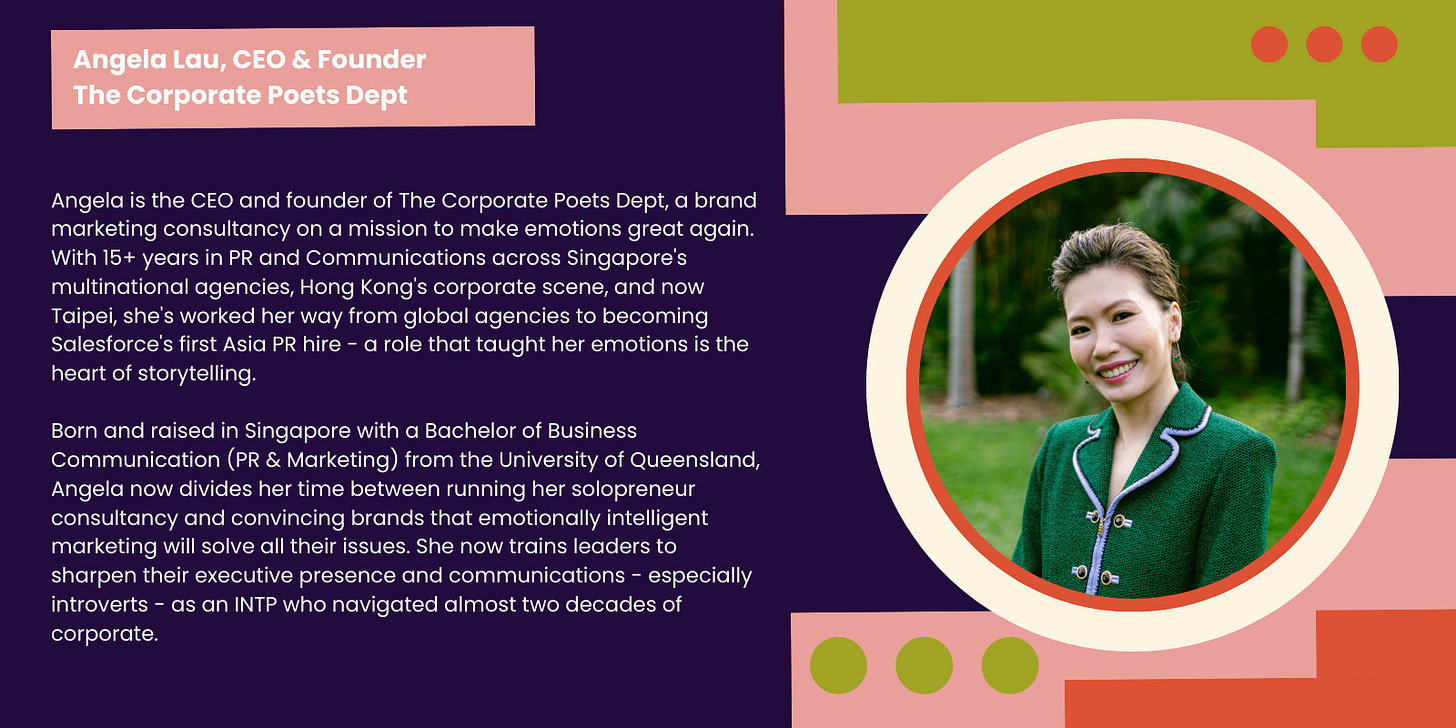Beyond the Deck #3: How to build a quiet authority and command every room you are in
The most powerful voices don't always speak the loudest.
In most corporate settings, the loudest voices often command the most attention, celebrated even. As an introvert who spent 15 years of my career in the extroverted world of PR and Communications, I've learned to command rooms authentically, without adopting the aggressive, patriarchal leadership stereotypes women often feel pressured to embrace.
I've also witnessed matriarchal leadership in corporate settings and experienced quiet authority firsthand. This makes the introvert versus extrovert debates irrelevant because true influence comes from depth, not decibels or showmanship.
The myth of the loudest voice
A 2010 study from Harvard revealed that extroverted leaders became a liability for company performance. Ideas fell on deaf ears as leaders were too busy being outgoing to act upon them. When leading proactive employees, especially, this extroversion costs companies their bottom line.
If your team comprises passive members who like direction, extroverted leadership has been shown to increase profitability. However, with self-starters and entrepreneurial employees, introverts lead more effectively, as research shows ideas are heard and bloom under their leadership.
The most powerful voices don't always speak the loudest because they understand something fundamental: authority isn't given, it's earned through consistent demonstration of value.
The three pillars of quiet authority
Preparation is your silent superpower.
Before you walk into any meeting - investors, customers, partners, or even media - make sure you have done your homework. This means going beyond the agenda items - you have the numbers, the technical implications, the market dynamics and especially the potential objections - all at your fingertips. When we are unprepared, we are doing the biggest disservice to ourselves. This level of preparation allows us to build confidence because we know our ground.
How to prepare: Your preparation framework
Research beyond the agenda: Understand why topics matter (any broader trends) and what alternatives exist
Anticipate questions: What will people ask? What data do they want?
Know your audience: What do they care about? How do they make decisions?
When you walk into a room knowing that no one else is more informed than you, you don’t need to raise your voice to be heard.
Authentic expertise: Depth over breadth
Credibility comes from one place: knowing what you're talking about. Quiet authority takes it further - being right in a way that helps others succeed.
Take Linus Torvalds, creator of Linux. He flies under the radar, rarely gives keynotes or appears in media interviews or podcasts. Yet his impact on technology and his influence on the software industry is immeasurable. His authority comes from decades of consistent, excellent work, and thoughtful decision making.
How to build authentic expertise:
Go deep, not wide. Master your domain thoroughly before expanding.
Share your knowledge generously: write columns, mentor others, contribute to discussions
Admit what you don’t know: Nothing builds credibility faster than intellectual curiosity
Stay curious: The moment you think you know everything is the moment your authority starts to erode
Strategic communication: Quality over quantity
Quiet authority is not about speaking less or being soft. It is about speaking better. Every word carries weight because people know that when you speak, it matters.
The strategic communication playbook
Lead with questions, not answers. “What if we approached this differently?” is so much more powerful than “Here’s what you should do”.
Use data as your voice: “The metrics show…” carries a lot more weight than “I believe...” or “I think…”
Be comfortable with silence: If you can master the pause, you have half the battle won. Comfortable silence creates space for others to process and respond thoughtfully
Speak to outcomes: Connect every technical discussion to business impact
Commanding rooms without commanding attention
Here’s the paradox of quiet authority: the less you try to command attention, the more you actually get it. This manifests through these subtle yet powerful techniques:
The power of positioning
Arrive early and position yourself strategically. If you're the leader, take up space at the head of the table. Women leaders take note.
Master thoughtful eye contact to show engagement. When speaking, slowly glance across the room - it shows confidence.
The strategic contribution
Lead early with value: Be the first to offer a thoughtful summary or clarifying question that demonstrates active listening
Claim your intellectual territory: Present your ideas before someone else does - leading with the idea beats agreeing with it
Use questions to guide: Ask questions that redirect the conversation toward your solution, giving others time to process before you present your perspective
Uplift others: Acknowledge good ideas to show humility and collaboration which are key building blocks for quiet authority
Common pitfalls to avoid
The impostor trap: All of us suffer from impostor syndrome at some point in our careers. Thinking we need to know everything before we can speak or contribute. Remember: authority comes from being helpful, not being perfect.
The waiting game: Believing that good work will be recognised. Or waiting for the right or good moment to contribute. There is no right or good moment, only the moment you choose to participate with value. Quiet authority comes from intentional communication and relationship-building.
The technical bubble: True authority is when you can speak in a language that people understand. When you can bridge technicality with business impact, you immediately establish authority.
The long game
Building quiet authority is not about an overnight transformation. It is about consistent, intentional actions that compound over time. Every well-prepared meeting, every thoughtful question, and every time you choose depth over surface-level engagement, builds your reputation as someone worth listening to.
In a world full of noise, be the signal. In rooms full of loud talkers, be the thinker. In an industry that often rewards the loudest voice, dare to be the valuable one.
The most powerful voices don’t always speak the loudest. True authority whispers, and everyone leans in to listen. This is the quiet authority we aim to build.
About the author:
Angela Lau is CEO and Founder of The Corporate Poets Dept.



